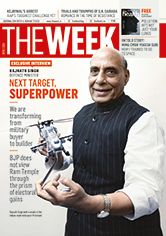Your interview with Rajnath Singh was quite detailed. He has been there for a long time, and is popular among the party cadre. And, he has a clean image (‘People are casting their votes only in Modi’s name’, April 7). It was Singh, who, as the BJP president, declared Narendra Modi as the prime ministerial candidate in 2013. Modi will never forget that. So Singh is already in Modi’s good books.
All said, I feel the BJP is overconfident this time around. It will fall short of majority, and, in that case, be dependent on allies. But will Modi prefer such an arrangement? Certainly not. He will not take instructions from anyone. Modi will continue to be the prime minister only if the BJP has a majority on its own.
Devender Kumar,
On email.
Singh’s answers were predictable. Even if you ask him tough questions he will play it safe or beat around the bush. That is how Singh, the quintessential Indian politician, is. I have not seen Singh get angry at anyone. He is always cool and without tension. Can’t we emulate him?
Akanksha Sinha,
On email.
Singh has done an exceptional job as the defence minister. Under his stewardship, the annual defence production shot up like never before. He provided Rafale fighter jets and Prachand choppers to the Air Force. He also passed orders to purchase bulletproof jackets for Army troops deployed in counter-insurgency operations and along the border.
Anil Deshpande,
On email.
Government made him popular
The story on G.N. Saibaba made for a good read. It is sad that the years in prison have had a severe impact on him (‘Love across fibreglass’, April 7). No government should suppress voices of dissent in this manner. With its actions, the government today has made Saibaba more popular. Saibaba should continue to speak for the oppressed.
Left-wing populism is on the wane, but if people like Saibaba are cornered for no fault of theirs, it will lead to the re-emergence of the ideology.
Manjeet Ghosla,
On email.
Good report
Your report on Wing Commander Yogesh Suri (retd) was well brought out. Astronaut training is sine qua non. It calls for tolerance to intense ‘G’ effects, coping up with spatial disorientation and a robust psychomotor skill and adaptation.
I have known Rakesh Sharma from his early days. Our population of 140 crore has had a lone cosmonaut to count all these years. It is an exciting news that ISRO will launch more Indians into space, all on our own resources.
Wing Commander Subramaniam Sankaran (retd),
On email.
We endorse EVMs
Your article on the trustworthiness of the EVMs has to be appreciated (‘Desi by design’, April 7). I have worked in elections in various capacities—from being a presiding officer to an observer. And I fully endorse the use of the EVMs. There are innumerable checks and balances in the system. The EVMs are standalone machines, running on batteries, and cannot be hacked through internet.
The EVMs are transported from one state to another and allotted to booths through a method called randomisation. Nobody knows which machine goes to which booth till the previous day of mustering, which is when election officials are taken to their respective booths. Just before the machines are sealed and thrown open for the public to cast their votes, the presiding officers of all booths hold mock-polls in the presence of polling agents of different parties to assure them that the machines are reliable.
Every time a vote is cast, a beep sound is clearly heard. The VVPAT assures the voter that his or her vote has been cast correctly. Some machines do conk out during the process. They are immediately sealed in the presence of the agents of various political parties, and a new machine is replaced at the earliest, after going through all the preliminary formalities. The votes in the defective machines can be retrieved later.
Jothindra P L.,
On email.
Your story has missed an important bit of information on the use of EVMs in Karnataka in 1983.The EVMs were used in Shantinagar constituency during the assembly elections in Karnataka. I was the first polling officer. As many as five training classes were conducted exclusively for poll personnel of the constituency. In addition, free access to the EVMs were provided at any time in the city corporation of Bengaluru.
In 20 days we were acquainted with the use of EVMs. We were also trained to operate the counting unit of the EVMs. When the results were declared, P.D. Govindarajan of the Janata Party defeated P.K. Ranganathan of the Congress. This led to the formation of the first non-Congress government in Karnataka. Ramakrishana Hegde became the chief minister. We were paid 040 more than our colleagues in other constituencies. The Congress leaders cursed the EVMs. I retired as joint secretary in 2016.
M.S. Shivaram,
Bengaluru.
Kudos to the Election Commission for the smooth conduct of polls over the years without the fear of the EVMs getting hacked or tampered with. Here, I must applaud former prime minister Rajiv Gandhi, who, in 1989, recommended technologies like the EVMs to be used in elections. But, then, when the Congress loses elections it blames the EVMs.
K. Venkata Ramana Rao,
On email.

